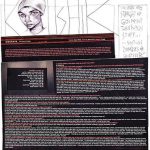Sitting out on the back deck at the Stones Throw Records headquarters just beyond downtown LA, with fresh braid patterns wrapped close to his head, Lib tells it straight: “I have a lot of albums with a lot of groups that ain’t real. I got CDs with mad groups that ain’t groups. And Yesterday’s [New Quintet] is just one of them y’all heard. Or Quasimoto.”
Or Madvillain, or Beat Conductor. While thugs duke it out for the title of King of Hip-Hop, Madlib is content to remain incognito, behind the scenes. But after creating and producing seven records in 2003, with critics gushing and music magazines offering their covers, it’s become increasingly difficult for Madlib to stay underground. His ultimate advantage in secrecy, though, is his use of pseudonyms. Once you think you know Madlib, he just changes his name and puts out another work of b-boy art.
But Madlib isn’t just creating new graffiti tags for an “inside joke” or to avoid stardom; he uses his aliases as musical personae, genre disguises that allow him to push the boundaries of what’s expected from your typical hip-hop producer. For example, Yesterday’s New Quintet is composed of five fictitious players who are all actually Madlib using various instruments, a sampler, and some hallmark production skills to give the appearance of a real live jazz band.
The name Madlib, however, seems to be held in special regard, as if it were a birth name (his real name is Otis Jackson, Jr.). It was as Madlib, after all, that he first surfaced on the scene in the late ’90s as an MC with Lootpack and a producer with the Alkaholiks. Since then, he’s paid his dues and prolifically laid the sonic groundwork to become the darling of the West Coast hip-hop underground (which makes him want to hide out even more). “I just don’t want Madlib all out there like that,” he says. “I wanna fool people, make it different.”
Leave this subterfuge to a soft-spoken kid from the drab suburb of Oxnard, California, born into a family of musicians, the backbeat of a nascent hip- hop scene running through his veins. Madlib’s father was a noted soul singer and his uncle, the great John Faddis, a classic jazz trumpeter for Diz and Mingus. I ask Lib if he thinks musical sense is somehow hereditary. “Yeah for sure. I’m doing it because of my parents basically. And their parents. My Pops put out my first record so you know, it’s all love.” Indeed, Madlib is the link to the next generation of black music, a new and vibrant hip-hop sound with unlimited variations and influences.
For someone so musically inclined, it’s astonishing that Madlib is basically self-taught, as both a producer and a multi-instrumentalist. In Madlib’s world, there’s a true advantage to not studying music formally. “You just have to bring out what’s in you,” he says. “Bringing out whatever you have in your head. I mean I’m not the greatest piano player, but I can put a vibe together on a song. I’m not a soloist – yet.”
As critics spill their admiration and major labels jockey for position, Madlib continues to do his own thing, making music for himself first and foremost. “I’d still be doing this if I wasn’t in any of those magazines… I make records every week,” Madlib says casually. “I’m just working on what I wanna do. See, I want to hear something that I ain’t really hearing – that’s what I usually try to do.” And not only is he succeeding, he’s doing it under more names than you might know.

